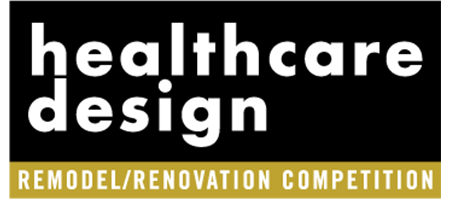Whitman-Walker Health’s Max Robinson Center opened more than 30 years ago in a former police station building that was retrofitted to deliver clinical care to the LGBTQ+ community in the greater Washington, D.C., region.
Named after area and national news broadcaster Max Robinson, who died from AIDS in 1988, the center embodies a commitment by the healthcare organization (founded in 1978) to lead in HIV/AIDS testing, research, and treatment.
The center also offers primary medicine, behavioral health, and dental care, as well as health-related legal and support services.
Purpose-driven design
Over the years, the original center underwent multiple renovations in Whitman-Walker’s efforts to meet evolving care standards while making patients feel welcomed and appreciated.
However, the institutional-looking building had few windows and its intentional visual separation from the street for privacy made the clinic feel hidden. Additionally, the building didn’t offer room to grow and wasn’t easily accessible by wheelchair, requiring patients to call from the parking lot to be assisted up a mechanical lift into the building.
For the past decade, Whitman-Walker Health began to look for a new clinic location that would capture the spirit of its mission: to offer inclusive, accessible, and affirming care.
“It was so important to us to find a space where we could expand care, but also a place where we could really build what we needed: an affirming environment for healthcare,” says Naseema Shafi, CEO, Whitman-Walker Health.
Opened in fall 2023 in D.C.’s Congress Heights neighborhood, the new 77,400-square-foot center occupies the first floors of a new office building. The location is close to a metro station and the in-development Cedar Hill Regional Medical Center, the first full-service hospital built in the district in more than 20 years, Shafi says.
“We had been looking for a space with good public transportation access for at least a decade. This space has that. … And [with the new hospital], the opportunity to be part of a full healthcare transformation for our region is once in a lifetime,” she says.
Clinic design that reflects the community
Delivering on the project’s goals to expand care, the new clinic has 24 exam rooms, compared to four in the previous building. A community pharmacy as well as retail space occupies the first floor; the second floor houses 9,000 square feet of research space; and clinical services on the third through fifth floors include gender-affirming care, youth and family support, behavioral health counseling, and dental health.
Whereas the old facility felt hidden, the design of the new center emphasizes visibility, says David Cordell, workplace interiors practice leader at Chicago-based Perkins&Will, the interior design firm on the project.
Specifically, large windows in the waiting areas, client service spaces, and staff café bring in daylight and offer outside views, but also views in.
“Those spaces are located at the edge of the building, so you have this presence through the windows—to bring the interiors to the exterior was a special moment,” says Nancy Gribeluk, managing principal at Perkins&Will (Washington, D.C.).
She says pops of color, with patterns inspired by African fabrics, reflect the community.
To foster inclusion, portraits of Max Robinson as well as diverse individuals, couples, and families are prominently displayed on the walls, along with Whitman-Walker’s motto “We See You.”
Max Robinson Center expands care, research capabilities
The Max Robinson Center also has room to grow, including its research department.
Specifically, Whitman-Walker Institute, a division of Whitman-Walker Health focused on HIV research, is partnering with George Washington University, to develop an advanced biomedical research space that will include a research pharmacy, says Jonathon Rendina, senior director of research at the institute as well as an associate research professor at George Washington.
“This will be by far our largest footprint for research across the district,” he says.
Additionally, Shafi says the center is also focusing on expanding care for young people, including using multipurpose space to host events like open mic nights.
“There’s a large population of young people in Ward 8 and we really want to get folks engaged in healthcare in a way that’s meaningful for them—for young people, that means helping them learn health skills to combat some of the chronic illnesses that people face as we age,” she says. “We’ve got space, and we’re excited about the opportunity to keep growing in a way that’s responsive to what the community tells us they need.”
Robert McCune is senior editor of Healthcare Design and can be reached at [email protected].











